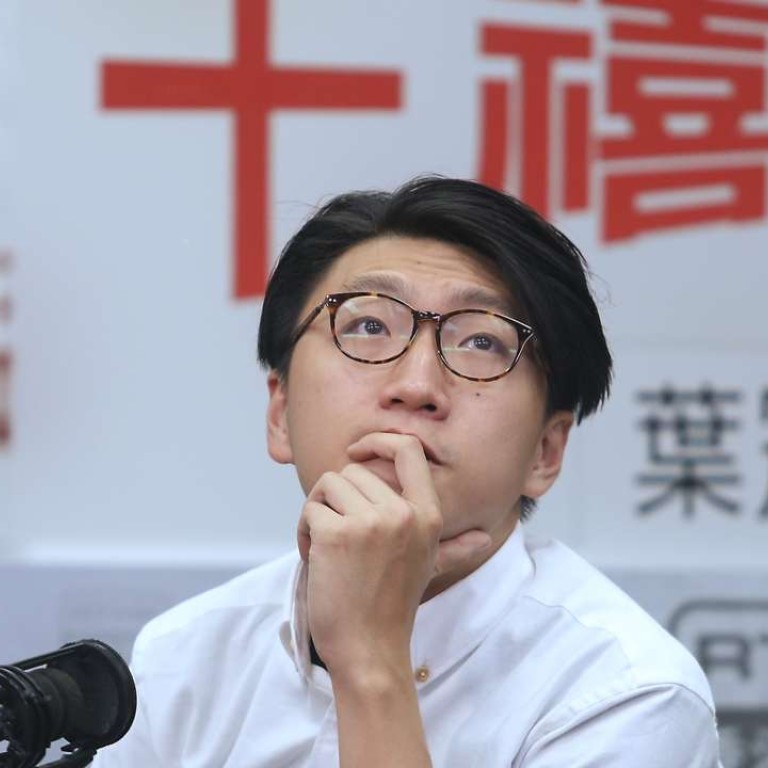
Will election ban on Hong Kong radical fuel a wave of public support for independence?
Edward Leung says winning the hearts and minds of the people is a vital part of his ‘revolution’
Localists have warned of more protests in the wake of Edward Leung Tin-kei’s disqualification from the Legislative Council race, but whether their actions can be sustained and, more importantly, receive lasting support from the public are the big unknowns.
What is certain is that the election ban has given the Hong Kong Indigenous leader an elevated stature he would otherwise not have enjoyed – an outcome not lost on him when he warned that his group’s only option now was to take to the streets.
“The contradictions and confrontations will intensify,” he said during an RTHK radio programme on Wednesday, without revealing their exact course of action.
Leung’s bid to win a seat in the legislature next month came to an end on Tuesday when returning officer Cora Ho Lai-sheung threw out his candidacy as she did not believe him to be sincere when he claimed he no longer backed the idea of Hong Kong independence.
Winning the hearts and minds of the public is an important part of a revolution
Following the invalidation of his candidacy, Leung said a “revolution” was necessary in retaliation.
During the radio programme, Leung added that a revolution entailed more than just street protests.
“Winning the hearts and minds of the public is an important part of a revolution,” he said. “We will have to try to reach out to every corner of the community so that more people from our generation and, more importantly, the next generation will also share the same dream.”
The Hong Kong Indigenous spokesman had previously advocated protests by any means necessary.
His group has been blamed for the violent clashes that erupted on the streets of Mong Kok in February. The riot lasted over 10 hours with protesters throwing bricks at police. More than a hundred people were injured.

“The 17 per cent of Hongkongers [who support Hong Kong independence in a recent survey] can’t even vote for their favoured candidate. They have no other ways to enforce change within the system,” he said. “I believe more people would be willing to sacrifice and use different means to fight against this government.”
Wong said Leung’s disqualification would lead to greater support for Hong Kong independence. “People can see that those in power are very afraid of separatism and that this is their political weakness,” he said.
Dr Chung Kim-wah, a social scientist at Polytechnic University, said the government’s move to disqualify Leung had “planted bombs in society”, stressing that the latest twist in the saga would encourage more people to oppose the government.
“This incident makes people very angry. Even if they don’t think Hong Kong breaking away from China is viable, I think more people will show sympathy and understanding towards localists and pro-independence groups,” he said.
The academic said the administration had overreacted, stating that the situation would be less volatile by allowing Leung to run.
Dr Ma Ngok, a political scientist at Chinese University, said he saw no signs there would be violent clashes in the immediate future. While support for localists would rise in the short term, whether this could be sustained hinged on Beijing’s approach to the city.
“The level of support for Hong Kong independence will depend on whether the city’s autonomy and freedoms can be maintained,” he said.
Meanwhile, a 22-year-old man was arrested in connection with recent intimidating remarks and threats online against returning officers after pro-independence activists were barred from the polls.
He allegedly posted comments on his Facebook page on July 30 about “getting mentally prepared” for “throwing stones”, “throwing bricks”, and “throwing bombs”.
Police said the man was arrested on suspicion of “obtaining access to a computer with an intent to commit an offence or with dishonest intent”, but declined to reveal his political background.
Police stressed they had acted on complaints and that the arrest had nothing to do with the suspect’s political background. The man was released on bail.

